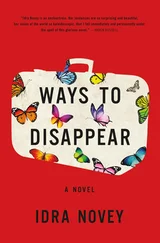Frederik sits calmly in his chair. “That’s quite all right with me. No problem at all.”
“Good. As a starting point, can you tell me how you felt about the other examinations you’ve had?”
Frederik starts talking, and he sounds perfectly healthy! It’s in his tone of voice, his choice of words. It’s that he himself takes the initiative and talks about more than he’s been asked. He’s the old sensible Frederik.
I’m overwhelmed, and after a couple of minutes I can’t sit still any longer, I feel compelled to interrupt him. “Frederik! This is fantastic, really fantastic! I haven’t heard you talk like this in an eternity! You’ve gotten so much better!”
“Yes, I’m getting better all the time. But I was actually about to tell the doctor about this test.”
Frederik goes on talking, until a little later when I feel the need to break in again. “I’m getting a bit worried now that Dr. Lebech will get the wrong impression of how sick you really are.”
He replies with the easy charm he used to be praised for. “Mia, you need to trust the doctor. Dr. Lebech is a neuropsychologist. You should have no trouble assessing my condition, right, Doctor?”
“That’s right.”
I look at Frederik and the doctor in turn. “But perhaps you should also show Dr. Lebech how you usually are — how you’ve been at home with me during the last few months.”
“I’m not going to act like something I’m not! That would be dishonest. And besides, Dr. Lebech is going to report on how sick I was then, not how sick I am now. The postoperative swellings have been exerting a pressure on my brain that is distinct from the pressure exerted by the olfactory meningioma they removed. So my symptoms after the operation should in any case differ from my symptoms before — right, Doctor?”
“Yes, that’s quite correct.”
“Good,” he says. “So if I could just be allowed to continue …”
My friends have told me it can be obnoxious, all the neurological terms I’ve started using in conversations on almost any subject. Frederik has never lain awake at night and read the scientific literature like I have. Nevertheless, he’s apparently picked up some technical expressions even I wouldn’t use.
I make an effort to sit quietly, but a few minutes later I simply have to interrupt again. “Frederik, why are you so well all of a sudden? It’s wonderful, of course — but why just now?”
“No need to exaggerate my illness, Mia! I feel in fact that I’ve been healthier the whole time than you make me out to be.”
“There, now you sound sick again.”
“I had better interpose here,” the doctor says. “It’s completely normal for someone to function better during an examination like this than in everyday life at home. If you’ve been anxious about this exam, the right level of stress in your brain — not too little, not too much — can eliminate your symptoms temporarily.”
She looks at me, and her pale round eyes twinkle in her pale round face. “Mia, of course you wish that Frederik could be like this all the time. But he can’t. It isn’t something he can control. And if he does have some hours when it goes well, then he may also become terribly tired afterward. What you and I find normal is an Olympic performance for him.”
I’m extremely impressed by this moon-woman. I came in here thinking I’d have to argue in some Kafkaesque show trial, yet after just a few minutes she’s displayed more understanding for my situation than my friends. It’s almost like when I talk to Bernard.
“I know,” I say. “And I’ve seen it come and go many times, but I’ve never seen … And I hope you don’t get the wrong impression.”
“You can trust me not to. That’s also what Frederik’s court case is about. A year and a half ago, you were much, much less sick than you are now, Frederik. And you seemed to be healthy nearly the entire time — though perhaps you needed to leave work earlier than you were accustomed to, didn’t you?”
“That’s right, I did.”
“Yes, you needed to relax with something that wasn’t too demanding. Maybe you watched TV, maybe you sat in your yard a bit to unwind?”
“Yes, that’s what I did.”
“Did you have headaches very often when you were relaxing at home?”
“I did.”
“But my male patients don’t ever tell anyone about them — so you probably didn’t either, did you.”
“No.”
“And so if one day you were feeling especially tired, or had a couple glasses of wine, or perhaps had been brooding about something that had worried you all day, then you’d experience the opposite of what you’ve been experiencing today with this exam, right? Your symptoms would manifest themselves. And then you couldn’t be trusted. Or could you, Frederik?”
“No, I couldn’t. I did some terrible things.”
“Yes. With the type of tumor I’ve seen on your scans, you might end up making some mistakes you would otherwise never make. And that would put a serious strain, wouldn’t it, on a marriage — or a work environment. But then of course it’d only be due to the disease.”
I sit up with a start. Her words just seemed to spill from her mouth, but didn’t she say what I’ve dreamt of ever since Frederik was arrested?
I strive to maintain composure. “You say it was due to the disease?”
“That would normally be the case. But now of course I just need to speak more with Frederik.”
She gazes at me with large sparkling eyes. She smiles again, and when she blinks, she does so slowly. As if she wants to tell me something she mustn’t say before she’s conducted the entire formal examination. I get goose bumps and can’t stop staring at her.
“From what I’ve read about Frederik, and the scans …” Her voice sounds just as relaxed as it was a moment ago. And then she repeats what she said, just as quietly. “It would normally be due to the disease. It wouldn’t be something he could help.”
She gives me a box of tissues she has standing behind the plastic brain. While I cry, Frederik doesn’t say anything, he just puts his arms around me and holds me like in the old days.
I don’t know how much time passes before I feel somewhat coherent again. I’m enveloped by Frederik’s body heat and he’s whispering small calming words in my ear, so that I feel his breath against my temple and throat. I look over at the doctor and say, “Thank you.”
I try to explain. “Everything else is so difficult. Just trying to cancel the subscription on Frederik’s phone or getting a plumber to come out. I thought that here I’d also have to argue and complain and … and I planned all kinds of things I was going to tell you about the Iowa Gambling Task.”
“I know that study quite well. Neurophilosophy is my great passion.”
“Neurophilosophy?”
“Yes — applying the methods of neurological research to questions of theoretical philosophy. Just as Damasio does with Descartes.”
Then Frederik resumes his account and I try to collect myself, staring into the convoluted folds of the plastic brain before me. Small letters on the region closest to me say INTERPRETATION OF SMELL, while alongside there stretches a belt composed of many small areas: INTERPRETATION OF TASTE, ABDOMEN, THROAT, TONGUE, TEETH.
Dr. Lebech’s test of Frederik’s neurological function lasts only ninety minutes, but she’s chosen tasks that challenge him where he’s weakest, and when he emerges from her office, he’s so beat that he can barely walk straight.
Twenty minutes later, after I’ve been in to talk with her too, he’s asleep in the waiting room, half reclining and half sitting across two chairs. I let him sleep, and I walk out to the parking lot to call Niklas.
Читать дальше



![Ally Carter - [Gallagher Girls 01] I'd Tell You I Love You But Then I'd Have to Kill You](/books/262179/ally-carter-gallagher-girls-01-i-d-tell-you-i-lo-thumb.webp)








